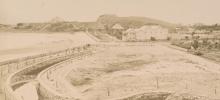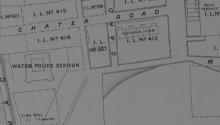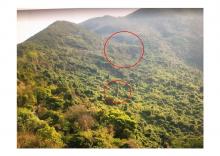Rose Terrace [????-1941]
Primary tabs
A 1900 map (UK National Archive ref: MPG 1-798) shows Rose Terrace on the east side of Robinson Road (Nathan Road) opposite the junction with Chater Road (Peking Road).
The following text comes from a Macau government website, but unfortunately Google takes me into a page where I can't see any navigation apart from 'next page'. So I can't tell which document the text comes from, but here is the link to it:
The first Portuguese to settle in the Tsim Tsa Tsui area of Kowloon was Mr. Mathias A. d’xevado. He was one of two brothers who went to Hongkong from Macao with an early batch of emigrants from the older colony in the 1840's. Mathias d’Azevado earned prominence by his unwavering faith in the future of Kowloon, which he was never tired of proclaiming in very esthusiastic terms. In him was to be found the good old Portuguese type of settler, sturdy and self-reliant. He bought one of the first Inland Lots in Tsim Tsa Tsui, below Signal Station Hill, and braving the malarial conditions of the early Sixties, when the efficacy of quinine was not generally recognised, he built on his land «Rose Terrace» (named after his wife, Maria Rosa), and occupied one of its four houses until his death Other members of the family lived in the same house for many years after. By leading the way for others to follow, Mr. Azevedo did for Tsim Tsa Tsui what Mr. Noronha did for Yaumati. He enjoyed the reputation of being one of the first non-Chinese settlers- if not the very first- on Tsim Tsa Tsui Peninsula.
When Mr. Azevedo first went to live at Tsim Tsa Tsui the seashore came almost to the steps of his house, and the sandy shores of the bay were dotted with matshed hutments (much like the present swimming shacks at Castle Peak Bay and along the shores of the New Territories). These matsheds on Tsim Tsa Tsui beach were often used as week-end residences by Hongkong families. They were built on single-acre lots, sold originally by the Government at the uniform price of seventy-five Mexican dollars -- as the unit of currency in Hongkong was then- apiece. Those same lots were worth about as many thousands in 1900, so phenomenally had the price of land risen in value! What each lot was worth in 1941 -- probably a quarter of a million dollars at the very best-could never have entered the heads of the original purchasers!
It is doubtful whether Mr. Azevedo ever dreamt what the value of his property would eventually turn out to be. Although his land had little commercial value at the beginning, yet with the steady development of the Peninsula and the construction of Kowloon's main thoroughfare, Nathan Road, on which «Rose Terrace» fronted, the property increased in value from year to year. His legatees eventually sold the site for a substancial sum. It was only shortly before the War came to Kowloon (in 1941) that «Rose Terrace» was pulled down. In its place stands to-day the group of shops know as «Chungking Arcade.» The syndicate which purchased the site from the Azevedo family had originally contemplated erecting a skyscraper, eighteen storeys high, for shops and apartments, but the scheme was dropped because of the war in China.
They get another mention in a report of a purse-snatch on page 1 of the China Mail, 5th Nov 1928. It agrees with the Chungking Arcade location:
[...] while she was walking along Nathan-road near Rose-terrace on Saturday.
Mr. Loseby said that his client was walking at about 7 o'clock when, on the pavement opposite Rose terrace, defendant snatched the bag from her hand. He ran around Rose-terrace to the vacant fields behind and thus into Middle Road. [...]





Comments
Re: Rose Terrace
Built in the 1860s. Confirmation of the naming of Rose Terrace after Mr. Mathias Azevedo's wife, Maria Rosa appears in the HK Telegraph dated 15 June 1940.